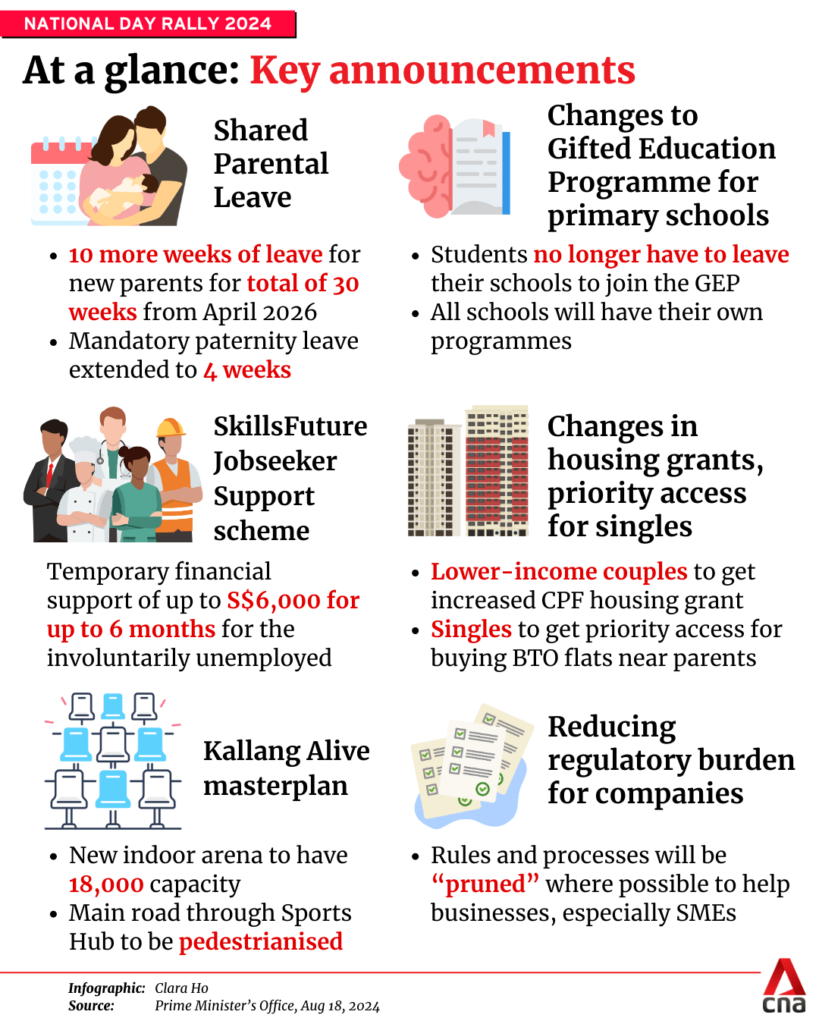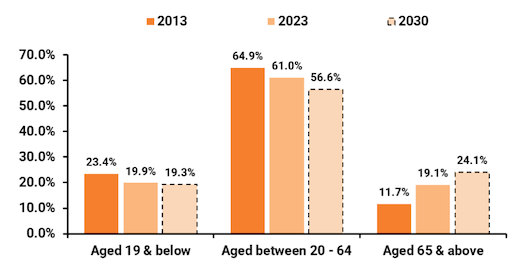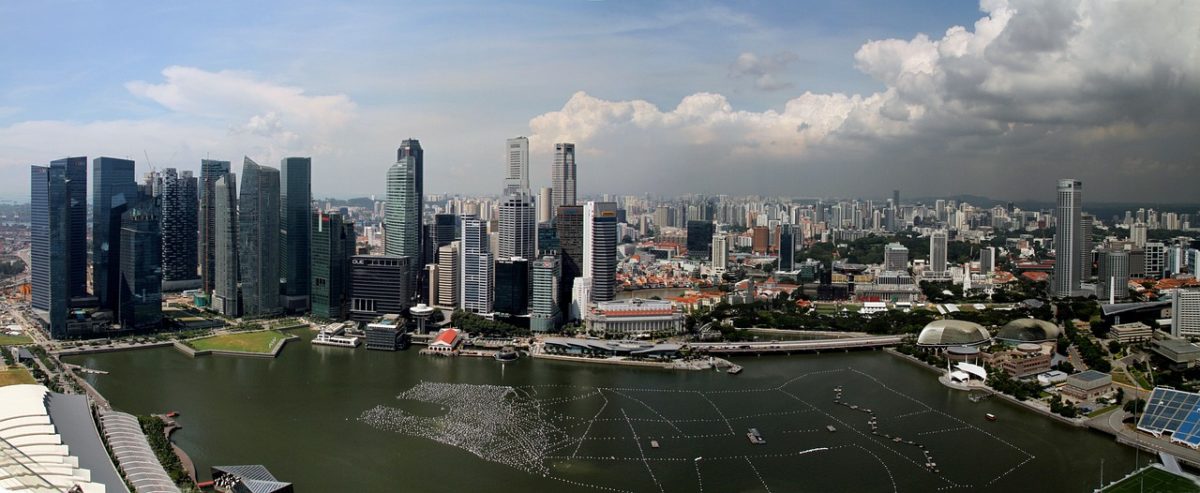- Policy announcements: Prime Minister Lawrence Wong has announced policies to support the middle class, address societal concerns, and maintain social stability in Singapore.
- Housing Affordability: Enhanced subsidies and adjusted income ceilings aim to make public housing more accessible for middle-income families, addressing the rising costs of private housing.
- Healthcare and Social Security: Increased healthcare subsidies and expanded CPF contributions are designed to ease the financial burden on the middle class, particularly in the face of rising medical costs.
- Education and Skills Development: Expanded subsidies for skills upgrading and lifelong learning seek to boost middle-class workers’ adaptability in a rapidly changing economy, ensuring continued upward mobility.
- Cost of Living Relief: Targeted financial relief, such as utility bill rebates and tax reliefs, aims to mitigate the pressures of rising living costs on middle-income households.
- Social Cohesion and Inequality: These policies aim to address middle-class disillusionment and prevent social fractures by ensuring economic opportunities remain accessible and social harmony is maintained amidst growing inequality.
Details
Singapore’s Prime Minister Lawrence Wong has recently announced a series of policies aimed at bolstering the middle class, addressing key societal concerns, and maintaining social stability. These policies are deeply intertwined with longer-term trends in Singaporean society, including the rising cost of living, middle-class disillusionment, and the broader challenges of sustaining social cohesion in an increasingly stratified society.
Key Policies Targeting the Middle Class
- Housing Affordability
- One of the most pressing issues for Singapore’s middle class has been housing affordability. PM Wong announced measures to make public housing more accessible to middle-income families.
- This includes enhanced subsidies for new Housing Development Board (HDB) flats and adjustments to income ceilings for eligibility. These changes aim to mitigate the rising costs of private housing, which have increasingly pushed middle-income families towards more affordable HDB flats.
- Healthcare and Social Security
- Another critical area of focus is healthcare affordability. The government has pledged to increase subsidies for middle-income families and expand the coverage of MediShield Life, Singapore’s national health insurance scheme.
- Additionally, enhancements to the Central Provident Fund (CPF) are designed to help middle-class Singaporeans save more effectively for retirement.
- Education and Skills Development
- To address the concerns of upward mobility, especially in a rapidly changing economy, PM Wong emphasised the importance of lifelong learning and skills upgrading.
- The government is expanding subsidies for courses that can help middle-income workers transition into new industries or upskill within their current professions. This aligns with the broader economic strategy of ensuring that Singapore’s workforce remains competitive in a global market.
- Cost of Living Adjustments
- Recognising the strain of rising costs, the government announced targeted relief measures such as rebates on utility bills and additional tax reliefs for middle-income families.
- These measures are aimed at easing the financial burden on households that may not qualify for the more substantial aid provided to lower-income groups, but still feel the pressures of rising expenses.

Societal Issues Addressed by These Policies
These policies are designed to counter several societal issues that have become more pronounced recently.
- Rising Cost of Living
- The increasing cost of living, driven by factors such as housing prices, healthcare costs, and inflation, has significantly impacted the middle class.
- By enhancing subsidies and providing targeted financial relief, the government seeks to alleviate some of the financial pressures that have contributed to a sense of economic insecurity among middle-income families.
- Middle-Class Disillusionment
- There has been growing disillusionment within the middle class, stemming from a perception that economic growth has not translated into improved living standards for all. This sentiment is exacerbated by the widening income gap and the perception that social mobility is stagnating.
- The recent policies, particularly those focused on education and skills development, are intended to restore confidence in the government’s ability to provide for the future and ensure that economic opportunities remain accessible to the middle class.
- Social Cohesion and Inequality
- Singapore has long prided itself on its social cohesion, but rising inequality poses a threat to this stability.
- By focusing on the needs of the middle class, the government aims to prevent societal fractures spreading upwards and downward, maintaining the trust that is essential for social harmony. The policies announced are part of a broader effort to ensure that economic disparities do not lead to social tensions.
Long-Term Trends in Singapore Society
These policies should be viewed within the context of longer-term trends in Singaporean society.
- Economic Stratification
- Over the past few decades, Singapore has experienced significant economic growth, but this has been accompanied by increasing stratification.
- The middle class, in particular, has felt squeezed between rising aspirations and the realities of slower income growth and higher living expenses.
- Ageing Population
- Singapore’s rapidly ageing population places additional pressure on the middle class, particularly in terms of healthcare and retirement planning.
- The recent enhancements to healthcare subsidies and the CPF are responses to these demographic challenges.
- Globalisation and Technological Change
- The pressures of globalisation and rapid technological change have created a more volatile economic environment.
- The focus on skills development and lifelong learning in PM Wong’s policies reflects an understanding of the need for adaptability in the face of these changes.

Analysis
The policies announced by PM Lawrence Wong are a strategic response to the evolving needs of Singapore’s middle class. By addressing the rising cost of living, enhancing social security, and promoting skills development, the government aims to counteract middle-class disillusionment and ensure that Singapore remains a cohesive and prosperous society. These measures are essential for maintaining social stability in the face of long-term trends that have made the middle class increasingly vulnerable.
